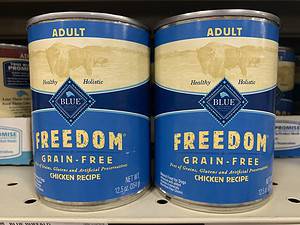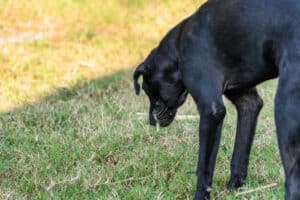Horses have been companions in labor, sports, and leisure for centuries. They are not exempt from the annoyances brought about by flies and other irritating bugs. These pesky insects can cause distress to our equine friends, causing physical and emotional disruption. As stewards of the natural world and advocates for eco-friendly solutions, it’s only fitting to explore the benefits of homemade fly spray for horses. This article will delve into the most effective homemade fly sprays for horses, recipes, benefits of homemade fly sprays, and concerns with commercial fly sprays.
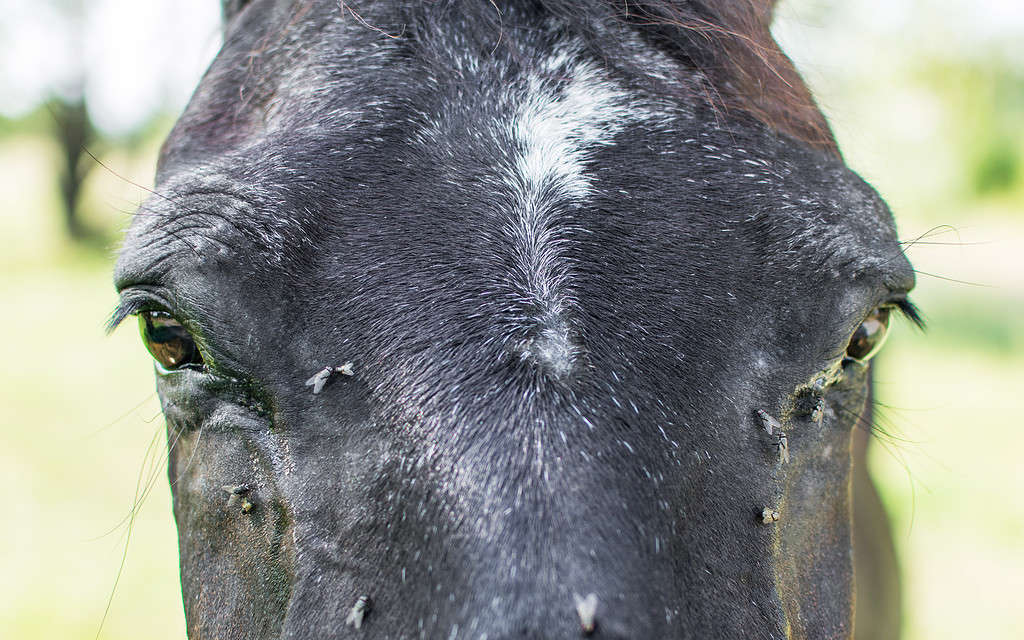
There are many different recipes for fly sprays that can suit the needs of different geographical locations and individual horses.
©BogdanV/iStock via Getty Images
Benefits of Homemade Fly Spray for Horses
Cost-Effectiveness and Efficacy
In the world of equine care, a world that can be expensive, every penny counts. Homemade fly sprays for horses can offer a cost-effective alternative to commercially available products. By sourcing ingredients yourself and preparing the spray at home, you can significantly reduce expenditures while ensuring that their equine companions are protected from the menace of flies.
The effectiveness of homemade fly sprays lies in combining the necessary ingredients in proper quantities for your location and specific needs. Carefully selected ingredients, such as carrier oils, essential oils, and vinegar, can serve as potent repellents against flies and other bothersome insects. When used in the right proportions, these ingredients can provide a robust shield for horses without breaking the bank.
Avoidance of Harsh Chemicals and Toxic Ingredients
One of the primary concerns for horse owners who prioritize the well-being of their animals is the potential harm caused by harsh chemicals found in commercial fly sprays. Many of these products contain toxic insecticides and repellents that may have adverse effects on horses, other animals, humans, and the environment. On the other hand, homemade fly sprays allow for complete control over the ingredients used. Furthermore, they offer a gentle yet effective solution for fly management.
Common components of homemade fly sprays include essential oils like citronella oil, lemon eucalyptus oil, tea tree oil, cedar oil, peppermint oil, and lavender oil, all of which are known for their natural insect-repelling properties. These ingredients effectively deter flies and eliminate the risk of exposing horses to toxic substances that may lead to skin irritations, allergies, or other health issues.
Eco-Friendly Solutions
As environmentally conscious individuals, it is crucial to consider the impact of our actions on the Earth’s ecosystems. Homemade fly sprays align with conservation, sustainability, and eco-friendliness principles. Commercial fly sprays often come in plastic bottles, which contribute to the ever-growing problem of plastic pollution. In contrast, homemade solutions allow horse owners to reuse containers, thereby reducing plastic waste.
Waste reduction is a paramount concern in the modern world, and every effort to minimize our ecological footprint matters. Homemade fly sprays for horses contribute to this cause by promoting the reuse of spray bottles. Instead of discarding empty commercial containers, horse owners can clean and refill them with homemade recipes. By reusing bottles, we decrease the demand for new plastic packaging and reduce the overall amount of waste in landfills. This sustainable practice aligns with the core values of conservation and environmental responsibility.
Moreover, the ingredients used in homemade fly sprays are typically biodegradable and do not leave harmful residues in the environment. This eco-friendly approach ensures that our beloved horses remain safe while minimizing the adverse effects on the natural world.
Tailoring Recipes to Specific Needs and Locations
No two horses are alike, and environments vary greatly depending on where you reside. The level of fly troubles can differ significantly from one location to another, affecting some horses more intensely than others. Homemade fly sprays offer the advantage of customization to suit individual needs and geographical areas. Horse owners can adjust the concentration of ingredients, choose ingredients that are most effective against local fly populations, and experiment with different combinations to create the most effective solution for their horses.
For example, a horse owner in a region with a high prevalence of certain fly species may choose ingredients that specifically target those pests, while an owner residing on swap-like lands such as in Florida or Minnesota may choose more potent ingredients or larger measurements of specific ingredients to create a stronger fly spray solution. This adaptability ensures that homemade fly sprays are eco-friendly and tailored to maximize their efficacy in different settings.
Overall, homemade fly spray for horses can be practical, cost-effective, and an environmentally responsible solution to the problem of fly management. Horse owners can protect their equine companions with the Earth in mind by avoiding harsh chemicals, reducing waste, and customizing recipes to specific needs.

The best homemade fly sprays include carrier oil, essential oils, vinegar, water, and even other ingredients.
©Dirk70/iStock via Getty Images
How to Make Homemade Fly Spray for Horses
Flys and other insects can cause significant discomfort to horses and significantly affect their quality of life. Let’s look at how to make homemade fly sprays for horses, including common ingredients, the importance of carrier oils, effective options, and proper usage.
Popular Ingredients for Homemade Fly Sprays
Crafting an effective homemade fly spray begins with carefully selecting the right ingredients. Commonly used ingredients include the following.
Essential Oils
Essential oils serve as fragrances and repellents that flies and insects do not like. Oils such as citronella oil, lemon eucalyptus oil, lavender oil, cedar oil, and peppermint are well-known for their natural insect-repelling properties. Citronella oil and lemon eucalyptus oil are often the most effective. They are primary deterrents against flies and other pesky insects.
Carrier Oils
Carrier oils are an essential part of the recipe, often overlooked but crucial for several reasons. Common carrier oils include coconut oil, vegetable oil, or mineral oil. The most natural options include jojoba oil, argan oil, sweet almond oil, coconut oil, or other similar oils. It is important to note that coconut oil will solidify in temperatures below 76 Fahrenheit (24 Celcius), so use it with caution. These oils serve as a base for the essential oils to stick to and help dilute them. This helps prevent skin irritation and provides a longer-lasting effect by allowing the solution to evenly adhere to the horse’s coat, creating an effective barrier.
Vinegar
Distilled white vinegar and apple cider vinegar are also popular ingredients in homemade fly sprays. They enhance the repellent properties of specific flies and insects and contribute to the overall health of the horse’s skin and coat.
Liquid Dish Soap
A small amount of liquid dish soap is sometimes added to the mixture to help disperse the essential oils evenly and improve the spray’s adhesion to the horse’s coat. It also acts as a repellent, as flies who come into contact with it may die.
Other Ingredients
Other ingredients to consider are glycerin or witch hazel. Glycerin and white hazel can act as mild carrier oils with a soothing quality. Furthermore, people have found other ingredients effective as repellants, such as Epsom salt, flat beer, strong tea, mouthwash, Dettol, methylated spirit, DEET, and permethrin. Some of these can be toxic, so caution is advised.
Water
Water serves as a diluting agent, ensuring that the spray is not overly concentrated.
The Importance of Carrier Oils
Carrier oils are a critical component of homemade fly sprays for horses and are often overlooked. They play several crucial roles in the effectiveness of the spray.
First and foremost, carrier oils serve as a medium to distribute and dilute the concentrated essential oils evenly. Essential oils are potent, and when applied directly to the horse’s skin, they can lead to irritation or reactions. Carrier oils act as a soothing buffer, ensuring that the essential oils are gentle on the horse’s coat and skin.
Furthermore, carrier oils provide a lasting, adhering effect. They allow the essential oils to adhere to the horse’s hair and skin evenly, ensuring the repellent properties are not easily washed away or evaporated. This extended duration of protection is essential in keeping flies and other insects at bay throughout the day.
Effective Options and Ingredients
When it comes to crafting an effective homemade fly spray for your equine companions, the choice of ingredients can make all the difference. Two standout essential oils known for their remarkable insect-repelling properties are citronella oil and lemon eucalyptus oil. These natural powerhouses not only deter flies but also offer a pleasant aroma. You can add additional horse-safe essential oils to alter the fragrance.
Selecting the right carrier oils to make a well-rounded homemade fly spray is crucial. Consider options like jojoba oil, sweet almond oil, argan oil, coconut oil, and the crowd-favorite mineral oil Avon Skin So Soft Original Bath Oil. You can also use other mineral oils or even vegetable oils. These carrier oils provide a smooth base for your essential oils and contribute to the spray’s overall effectiveness by helping them adhere to your horse’s coat.
Incorporating white distilled vinegar or apple cider vinegar into your homemade fly spray adds a layer of repellent potency. Vinegar is known for its effectiveness in keeping certain flies at bay while contributing to the overall health of your horse’s skin and coat.
While some may consider using harsher ingredients such as Dettol, methylated spirit, DEET, permethrin, and more in homemade fly spray recipes, we discourage these options. These chemicals can be toxic to animals and humans and further pose environmental risks.
Using Homemade Fly Spray for Horses
It’s imperative to follow a few simple yet essential guidelines to ensure the optimal effectiveness of your homemade fly spray for horses.
Shake vigorously before application. Before use, give your homemade fly spray a vigorous shake. This ensures that all the ingredients are thoroughly mixed, allowing for even distribution.
Be mindful of sensitive areas. When applying the spray, be extra cautious around sensitive areas like your horse’s eyes, ears, and nostrils. To protect these delicate spots, use a cloth or sponge to apply the spray around these areas gently.
Patch test first for safety. Before applying the homemade fly spray to your entire horse, perform a patch test. Apply a small amount to a discreet area of your horse’s skin to check for adverse reactions or allergies. Safety always comes first.
Proper storage is key. Store your homemade fly spray in a cool, shaded area away from direct sunlight. This safeguards the integrity of the essential oils and ensures long-lasting effectiveness.
Reapply the fly spray as necessary. Homemade fly sprays, like their commercial counterparts, require reapplication. They may require more frequent application than commercial fry sprays since they are comprised of natural ingredients. Factors such as wet conditions or heavy fly activity may also necessitate more frequent use. Keep an eye on your horse’s comfort and reapply as needed.
By following these guidelines, you can maximize the benefits of your homemade fly spray, providing your horse with adequate protection against flies and other pesky insects.
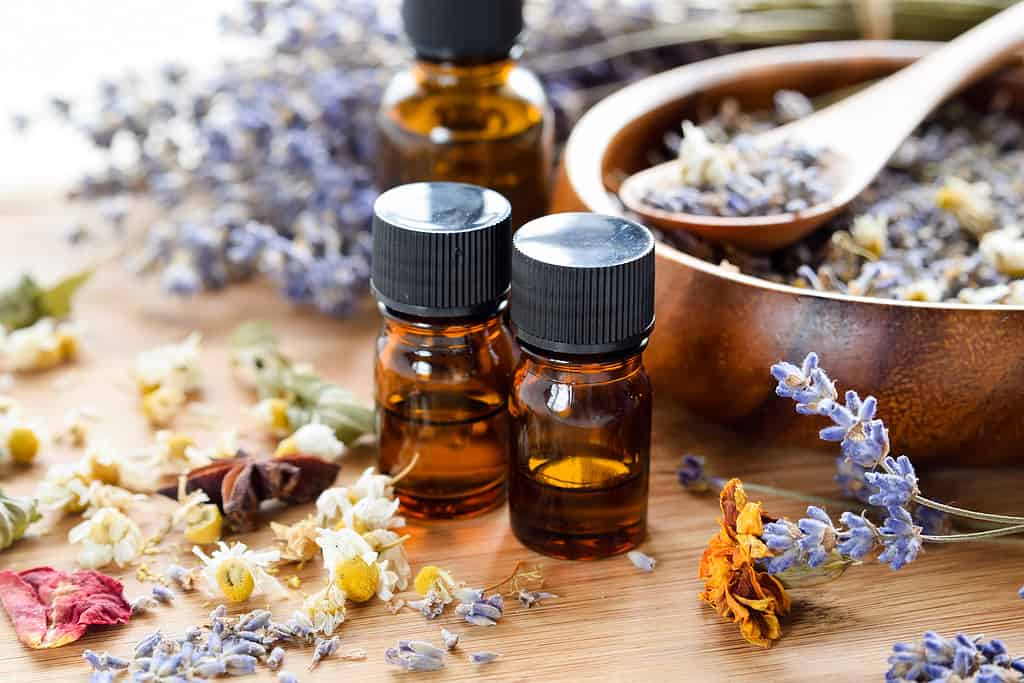
Homemade fly sprays can be effective with a proper combination of ingredients along with high enough measurements to ensure potency.
©botamochi/iStock via Getty Images
Recipes: Most Effective Homemade Fly Spray for Horses
Homemade fly sprays offer a natural and effective solution that not only keeps flies at bay but can also omit harsh chemical use. However, it’s important to note that these recipes are used at your own risk, and it’s essential to be aware of any allergies or reactions you or your horse may have to the ingredients. We recommend consulting with your veterinarian and performing a small patch test on your horse before full use. Below are two effective homemade fly spray recipes, along with additional options for those who seek a variety of choices from all-natural to utilization of chemicals.
Recipe 1: The Most Effective Natural Homemade Fly Spray for Horses
This fly spray recipe combines potent natural ingredients to create a powerful deterrent against flies while maintaining a natural and eco-friendly approach. It has proven to be a crowd favorite among many horse owners.
Ingredients:
- 4 oz (or more) Avon Skin So Soft Original Bath Oil
- 5 oz (or more) citronella oil
- 5 oz (or more) lemon eucalyptus oil
- 1.5 cups distilled white vinegar
- 1.5 cups water
Instructions:
1. Pour all the ingredients into a 2-liter bottle.
2. Ensure that the bottle is tightly sealed.
3. Shake well before each use to mix the ingredients thoroughly before application.
4. Add more essential oils if a stronger repellent potency is needed.
Recipe 2: Natural Homemade Fly Spray for Horses
This alternative natural fly spray recipe offers a slightly different blend of essential oils, vinegar, and water, creating another effective solution.
Ingredients:
- 6 oz (or more) carrier oil
- 10 oz (or more) citronella oil
- 5 oz (or more) lemon eucalyptus oil
- 2 oz (or more) lavender oil or peppermint oil
- 2 cups apple cider vinegar
- 2 cups of cold strong tea
Instructions:
1. Combine all the ingredients in a 2-liter bottle.
2. Ensure the bottle is securely closed.
3. Shake well before each use to mix the ingredients thoroughly before application.
4. Add more essential oils if a stronger repellent potency is needed.
4 Outlines for Fly Spray Recipes
| Recipe Outline | Ingredients |
|---|---|
| All Natural Recipe Outline | 1. Carrier oil 2. Essential oils 3. Vinegar 4. Water, Herbal Solution, or Botanical Solution |
| Chemical Recipe Outline | 1. Carrier oil (optional) 2. Insecticide, Dettol, or Methylated Spirit 3. Water |
| Other Recipe Outline 1 | 1. Carrier oil (optional) 2. Epsom salt 3. Flat beer 4. Mouthwash |
| Other Recipe Outline 2 | 1. Carrier oil 2. Essential oils 3. Vinegar 4. Liquid Dishsoap 5. Water, Herbal Solution, or Botanical Solution |
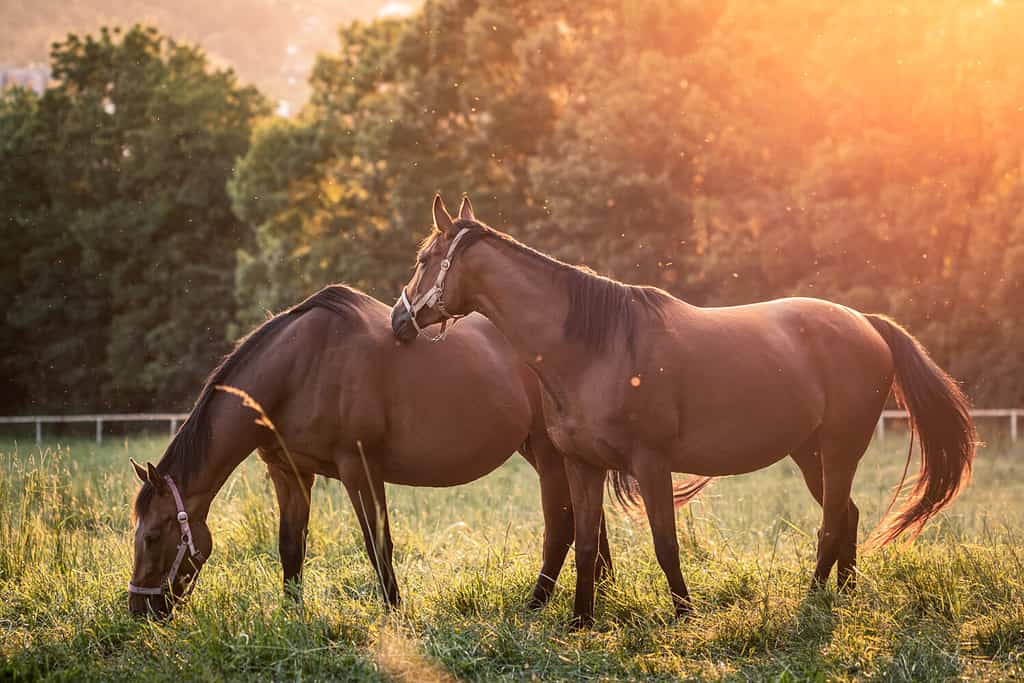
Some horses are more sensitive to flies than others. This is also true for fly sprays.
©encierro/Shutterstock.com
Concerns With Commercial Fly Sprays for Horses
Commercial fly sprays for horses have long been a go-to solution for horse owners seeking to protect their equine companions from the relentless torment of flies and other insects. However, while these products offer convenience, they come with concerns related to safety, environmental impact, and potential long-term effects.
Toxic Ingredients
Many commercial horse fly sprays contain synthetic chemicals, including pyrethroids and organophosphates, which can be toxic to horses, other animals, and humans. Prolonged exposure to these chemicals may lead to skin irritations, respiratory problems, and even more severe health issues in horses and those who handle commercial fly sprays or those who are exposed to them.
Environmental Impact
The environmental consequences of commercial fly sprays cannot be ignored. The runoff from these sprays can contaminate soil and water, posing risks to aquatic life and affecting the broader ecosystem. Some chemicals used in these sprays are non-biodegradable, contributing to long-term pollution.
Unknown Long-Term Effects
The long-term effects of continuous exposure to synthetic fly spray ingredients are not fully understood. Studies on the cumulative impact of these chemicals on horses and the environment and exposure to humans are limited, leaving questions about potential health risks unanswered.
Allergic Reactions
Both horses and humans can be allergic to the ingredients in commercial fly sprays. Allergic reactions in horses may manifest as skin irritations, swelling, or respiratory distress. For humans, skin contact or inhalation of these chemicals can lead to similar reactions, underscoring the need for caution when handling products that utilize chemicals.
Resistance
Continuous use of commercial fly sprays can contribute to the development of insecticide resistance among fly and insect populations. Flies and insects that survive exposure to these chemicals may pass on their resistance to future generations, making it more challenging to control fly and insect populations over time.
In light of these concerns, horse owners are turning to natural and homemade fly sprays as safer and more environmentally friendly alternatives. These solutions use essential oils, carrier oils, vinegar, and other ingredients to effectively repel flies while minimizing the risks associated with synthetic chemicals.
It is important for horse owners and the equine industry as a whole to remain vigilant, explore safer alternatives, weigh personal options, and consider the consequences of all fly control methods.
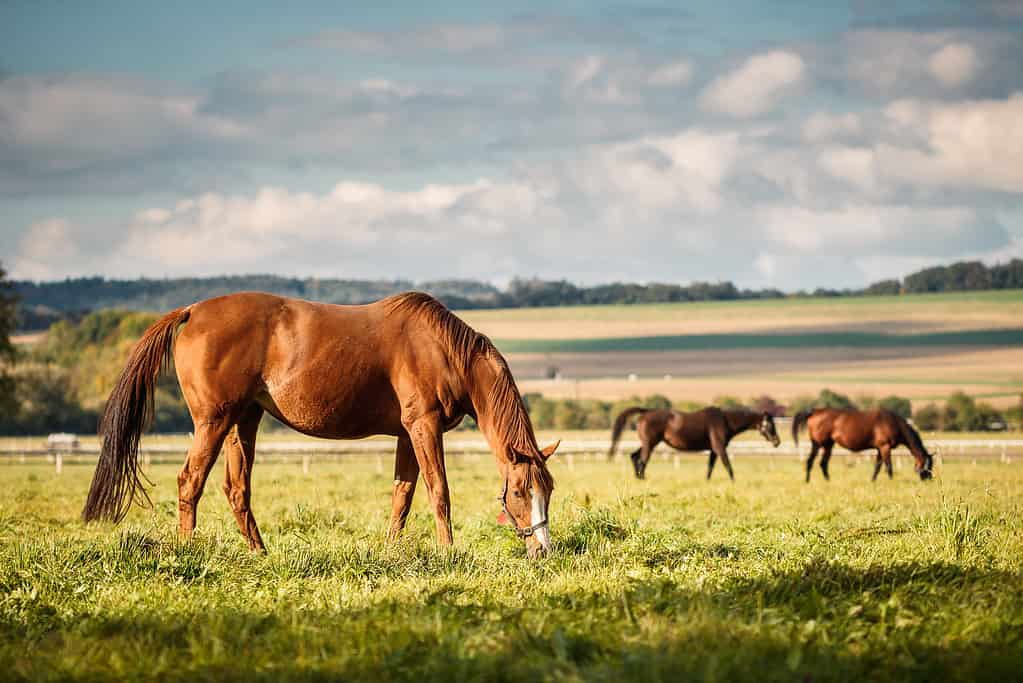
Flies can greatly affect a horse’s quality of life. Effective fly management is essential.
©Zbynek Pospisil/iStock via Getty Images
Conclusion
To provide our equine companions with relief from the persistent torment of flies and other insects, homemade fly sprays emerge as an effective solution. They offer a compelling alternative to commercial products based on careful selection and consisting of various ingredients, including essential oils, carrier oils, vinegar, and other ingredients. They not only repel flies effectively but also minimize or even omit the use of synthetic chemicals that come with potential risks.
The most effective homemade fly sprays typically feature ingredients like citronella oil, lemon eucalyptus oil, and other essential oil blends. Carrier oils such as mineral oil (including Avon Skin So Soft Original Bath Oil), sweet almond oil, jojoba oil, argan oil, coconut oil, and vegetable oil act as a base, ensuring proper dilution and long-lasting adherence to the horse’s coat.
Moreover, aside from chemical ingredients, vinegar, herbal infusions, botanical infusions, and additional ingredients like liquid dish soap, flat beer, Epsom salt, and mouthwash offer more choices for those seeking diverse options when creating their homemade fly spray that suits the needs of their horses and the location they reside.
While homemade fly sprays are great for their natural and eco-friendly attributes, it is essential to perform patch tests to ensure the horse’s comfort and safety. These homemade solutions provide horse owners with the means to protect their equine friends while promoting responsible and environmentally conscious practices.
The photo featured at the top of this post is © encierro/Shutterstock.com
Thank you for reading! Have some feedback for us? Contact the AZ Animals editorial team.





